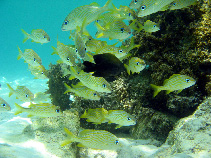| Family: |
Haemulidae (Grunts), subfamily: Haemulinae |
| Max. size: |
30 cm TL (male/unsexed) |
| Environment: |
reef-associated; marine; depth range 0 - 60 m |
| Distribution: |
Western Atlantic: Bermuda, South Carolina (USA), and northern Gulf of Mexico to Brazil; throughout the West Indies and the coasts of Central America (Ref. 3798). |
| Diagnosis: |
Dorsal spines (total): 12-12; Dorsal soft rays (total): 14-15; Anal spines: 3-3; Anal soft rays: 8-8. Mostly yellow, paler below. Scales below lateral line in oblique rows and much larger than those above lateral line. No other grunt has enlarged scales below the lateral line (Ref. 26938). |
| Biology: |
Occurs in large schools on rocky and coral reefs, often under ledges or close to elkhorn coral (Ref. 9710). Juveniles abundant in near-shore seagrass beds (Ref. 9710). Feeds mainly on small crustaceans (Ref. 3798). Marketed fresh (Ref. 3798). |
| IUCN Red List Status: |
Least Concern (LC); Date assessed: 10 October 2015 Ref. (130435)
|
| Threat to humans: |
reports of ciguatera poisoning |
Source and more info: www.fishbase.org. For personal, classroom, and other internal use only. Not for publication.

